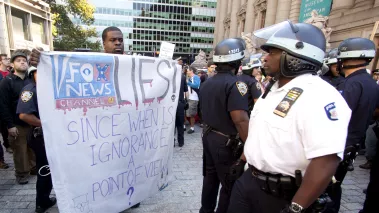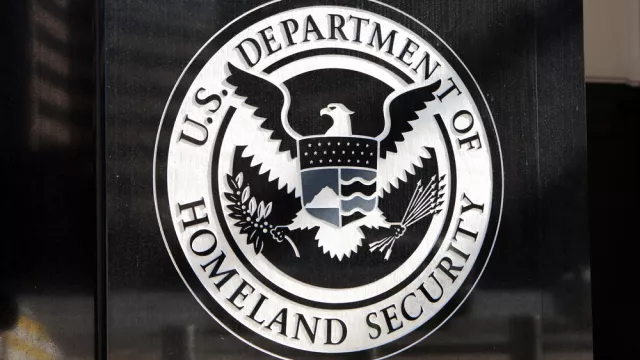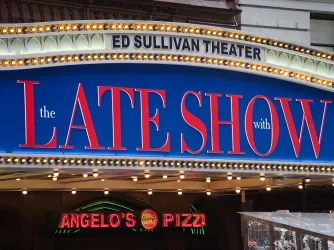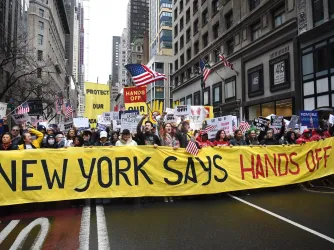Table of Contents
Why (most) lies are protected speech, and why they should stay that way

Glynnis Jones / Shutterstock.com
A policeman walks by a protester who is holding a sign that reads 'Fox News Lies' on the one-year anniversary of the Occupy Wall Street protests in New York City.
Lies are a problem.
In fact, one can persuasively argue that lies are the problem.
Few behaviors are as corrosive to our social fabric or as foundational to our societal divisions. Lies severely hobble our ability to communicate effectively, our capacity to understand reality, and our attempts at securing social and moral progress. As a result, it’s understandable to conclude that using government power to prohibit and eliminate lies is justified.
The thing is, that’s a terrible idea.
While some exceptions exist, there are good reasons why our Constitution protects most forms of dishonesty, deception, and artful deviations from the truth. In this explainer I’ll go over these reasons and outline why, for all the difficulty and damage they certainly cause, most lies are and should remain protected speech.
What exactly is a lie, anyway?
Most of us can agree that lies are the opposite of truth, but opinions vary from that point forward.
Must lies require a conscious attempt to deceive? If the speaker believes the falsehood, are they lying regardless? Can statements once thought to be true retroactively become lies once they’re discovered to be false?
Things get weirder when you start factoring in things like fiction, satire, or parody. Are those technically “lies”? What if something is mostly true, or mostly false? At what point does a statement cross the threshold into being an official lie?
Hopefully these questions illustrate the difficulty of knowing how and where to draw these lines. Now imagine trying to legislate all this. How can you legally tell the difference between lies and honest mistakes? How much does intention play into your definition, and how can you reasonably gauge it? Perhaps most importantly: How can you ensure that whatever laws you create to stamp out lies don’t get abused or stamp out important truths along with them?
This last question has been central to why discussions about regulating lies with laws have been so difficult, and why they’ve almost always ended by erring on the side of letting false speech stay free.
But what about lies we know are lies? Shouldn’t the government legislate against those? The Supreme Court would wrestle with this very question in a landmark 2012 case, United States v. Alvarez.
The case of stolen valor
During a meeting of the Three Valley Water District Board in Claremont, California in 2007, Xavier Alvarez stepped up to introduce himself. “I’m a retired marine of 25 years,” he said. “Back in 1987, I was awarded the Congressional Medal of Honor.”
These were lies, and Alvarez was in the habit of telling them. In the past he had claimed he played hockey for the Detroit Red Wings and that he had once been married to a Mexican starlet. But by purporting to have received a military medal, Alvarez had taken his dishonesty into new and more serious territory: He had violated the Stolen Valor Act of 2005, which criminalized lying about having or receiving a military honor.
Alvarez was indicted and pleaded guilty to the charge, but appealed on the basis that the law itself was an unconstitutional, content-based restriction of his right to free speech. In other words, the statute restricted speech specifically based on what it is saying, in violation of the First Amendment.
The short answer to why lies are constitutionally protected is that, outside of a few narrow and formally recognized categories of unprotected speech, the First Amendment is neutral regarding the content of the speech it defends.
The Supreme Court agreed. “Absent from those few categories where the law allows content-based regulation of speech,” Justice Anthony Kennedy wrote for the majority, “is any general exception to the First Amendment for false statements.” Moreover, Justice Kennedy noted that “some false statements are inevitable if there is to be an open and vigorous expression of views in public and private conversation, expression the First Amendment seeks to guarantee.”
The Court’s analysis recognized two critical points: First, that bans on specific lies are content-based restrictions on speech. Second, that in order to preserve the freedom of expression the First Amendment defends, lies must be protected the same way as any other speech.
Lies and the First Amendment
The short answer to why lies are constitutionally protected is that, outside of a few narrow and formally recognized categories of unprotected speech, the First Amendment is neutral regarding the content of the speech it defends.
This principle was expressed beautifully by Justice Thurgood Marshall in the 1972 Supreme Court case Police Department of Chicago v. Mosley, which questioned the constitutionality of a city ordinance banning non-union picketing outside of a school building. In the majority opinion, Marshall wrote, “the First Amendment means that government has no power to restrict expression because of its message, its ideas, its subject matter, or its content.”

Is hate speech protected by the First Amendment?
Is hate speech protected by the First Amendment? The First Amendment makes no general exception for offensive, repugnant, or hateful expression.
This means that the First Amendment almost universally prohibits content-based regulation of speech. Because they target the substance of speech and are easily used to suppress disfavored ideas, content-based laws or regulations are presumed unconstitutional, and the government must meet a very heavy burden to justify them.
That burden is strict scrutiny — the highest standard in First Amendment law, which requires the government to prove the regulation “furthers a compelling interest and is narrowly tailored to achieve that interest,” as outlined in Reed v. Town of Gilbert, Arizona, et al. Interests are “compelling,” the First Amendment Encyclopedia explains, when they are regarding “regulation vital to the protection of public health and safety, including the regulation of violent crime, the requirements of national security and military necessity, and respect for fundamental rights.”
The key here is that any regulations must not only advance a “compelling” interest, but must also not restrict our ability to speak freely (and dishonestly) beyond what is necessary to further that interest.
As noted above, not all expression is protected by the First Amendment: The Supreme Court has identified “historic and traditional” limitations on a few “well-defined and narrowly limited classes of speech.” These include incitement (Brandenburg v. Ohio), true threats (Virginia v. Black), and obscenity (Miller v. California).
In cases such as the United States v. Robert J. Stevens, however, the Court emphatically rejected as “startling and dangerous” the idea of a “free-floating test for First Amendment coverage” that requires speech to survive an ad hoc balancing of its costs and benefits. Rather, the “First Amendment itself reflects a judgment by the American people that the benefits of its restrictions on the Government outweigh the costs.”
Lies the First Amendment doesn’t protect — and why
When it comes to lies or dishonesty in particular, there are a few forms of it that fall under constitutionally unprotected speech, such as fraud, perjury, and defamation. Even in these cases, though, it’s not so much the lies themselves being acted against, but rather their specific and measurable consequences.
With respect to perjury, for example, false testimony in a criminal trial can lead to a wrongful conviction, affecting the life and liberty of an innocent defendant. Likewise, fraud in the form of false advertising, or other deliberate misrepresentations made for economic or personal gain, can be criminalized due to the clear material costs imposed upon those who fall prey to it.
The First Amendment generally protects speech from government punishment or censorship even if that speech is dishonest or false.
Defamation, defined as “a false statement that harms the reputation of another,” is perhaps the most well-known of unprotected lies. It’s also very easy to understand the reasoning for it. A lot rides on reputations, and having ours smeared or destroyed can lead to real harm.
However, “harm” can also be incredibly subjective, and defamation can easily be used as a cudgel rather than a legitimate defense of one’s own honor. That’s why judges tread very carefully in defamation cases, and it’s why defamatory statements must meet a specific set of criteria to hold up in court.
As Ronald K.L. Collins, David L. Hudson Jr., and FIRE Legal Director Will Creeley outline in “First Things First: A Modern Coursebook on Free Speech Fundamentals”:
A defamation plaintiff must establish all of the following six elements:
- Identification: The publication was “of and concerning” the plaintiff.
- Publication: The defamatory statements were disseminated to a third party.
- Defamatory meaning: The statements in question were defamatory.
- Falsity: The statements must be false. Truth is an absolute defense to a defamation claim. Generally, the plaintiff bears the burden of proof of establishing falsity.
- Statement of fact: The statements in question must be objectively verifiable as false statements of fact. This means the statements were presented as true facts, but are demonstrably false.
- Damage: The false and defamatory statements must cause actual injury or special damages.
Proving defamation can be really tough, and it gets even tougher if you’re a public figure, like a celebrity or a politician. As we covered in our explainer on the New York Times Co. v. Sullivan Supreme Court case, the limits on defamation law are meant to prevent the chilling effect caused by the use of legal action to silence criticism, satire, parody, or dissent. The bar is very high because courts are rightly afraid that general restrictions on speech, however false or unsavory, will violate not just the First Amendment but the principles of free expression that undergird it.
Other forms of unprotected lies include making false statements to government officials concerning official matters, falsely speaking on behalf of the government, and impersonating a government officer. But as with perjury, fraud, and defamation, the lies themselves aren’t the only reason for that being unprotected speech. All of these infractions focus on falsehoods that prevent or disrupt official government action — especially if it would end up infringing upon the rights of others.
Like any deviation from the presumption that speech is protected, these exceptions to the rule are limited, narrowly defined, and place the burden on the government to justify. First Amendment law recognizes that any attempt to suppress freedom of speech, no matter how well-intentioned, is a perilous endeavor. Carelessly allowing the government to regulate what can and cannot be said will cost us more than we bargained for. That is why each category of unprotected speech has been approached with a careful eye toward preserving free expression and avoiding government overreach — and the bar is set high for good reason.
Why lies should remain protected speech
The First Amendment generally protects speech from government punishment or censorship even if that speech is dishonest or false. But is that really the right thing to do? Given our current climate of fake news, misinformation, disinformation, and election lies, shouldn’t we use government power to set the record straight and establish the truth?
Not unless you think you or someone else can square all the lingering concerns about the risk of overbroad, overextended, or overapplied laws. As we covered in our explainer on misinformation, disinformation, and malinformation, allowing the government to define what constitutes these forms of speech is basically begging for it to abuse its power.
It is the government’s job to keep our speech free. It’s our job to find and uphold the truth through the use of that speech. That’s a lot of work and responsibility, and it can often be messy, but the alternatives have far greater and graver costs.
Just imagine the authority to determine and regulate lies in the hands of your worst enemies. Do you trust them to use it honorably? Why should they, then, trust you? The problem also goes beyond intentions. Even the most honest and well-meaning political actors can unwittingly succumb to bias, and the incentives to suppress inconvenient truths or ignore expedient lies are far too great to dismiss.

Government attempts to label speech misinformation, disinformation, and malinformation are a free-speech nightmare
Allowing the government to decide what speech is and is not fit for public consideration will likely make the problem worse.
And as with most arguments relating to the restriction or regulation of free expression, the questions remain: Who decides? How do they decide? And who watches the watchmen?
In the majority opinion explaining why the Stolen Valor Act infringes upon free speech rights, Justice Kennedy stated the following:
The remedy for speech that is false is speech that is true. This is the ordinary course in a free society. The response to the unreasoned is the rational; to the uninformed, the enlightened; to the straight-out lie, the simple truth… The First Amendment itself ensures the right to respond to speech we do not like, and for good reason. Freedom of speech and thought flows not from the beneficence of the state but from the inalienable rights of the person. And suppression of speech by the government can make exposure of falsity more difficult, not less so. Society has the right and civic duty to engage in open, dynamic, rational discourse. These ends are not well served when the government seeks to orchestrate public discussion through content-based mandates.
While striking down the law, Justice Kennedy also reaffirmed the principles of free expression and open discourse that the First Amendment has always protected and represented. Yes, lies may be divisive, dangerous, and destructive to our relationships, our social order, and our polity — but the truth can’t be enforced through the authority of the state. It is the government’s job to keep our speech free. It’s our job to find and uphold the truth through the use of that speech. That’s a lot of work and responsibility, and it can often be messy, but the alternatives have far greater and graver costs.
Some argue that times have changed — that modern technology has fundamentally shifted our discourse to the point where drastic, even draconian interventions on lies and misinformation are required. But the critical questions of who to grant that power to and how to check it linger on, and it is unlikely that they can ever be truly or satisfactorily answered.
In the meantime, lies are the price we pay for the freedom to discover the truth for ourselves.
Recent Articles
Get the latest free speech news and analysis from FIRE.

He refused to censor his syllabus — so Texas Tech cancelled his class

Fandom’s lighthouse in a sea of censorship

FIRE statement on Stephen Colbert’s James Talarico interview and continued FCC pressure


